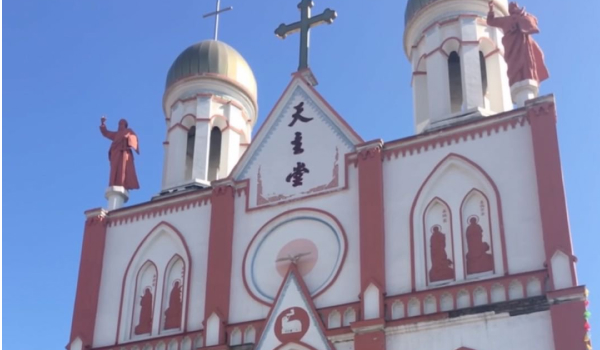
In a land area of 1,600,000 square kilometers, the diocesan territory covers the Xinjiang Uygur Autonomous Region in northwestern China, with Urumqi, the Xinjiang capital. It is located 2,400 kilometers northwest of Beijing.
In the diocesan territory, the population is 21.59 million at end of 2009. (The population of the whole country is 1.3 billion). Most residents in the vast terrain are Muslim ethnic Uighur, the 10,000 Catholics consists of ethnic Han, the principal ethnic group of China. Many Catholics in Urumqi came from Gansu and Shaanxi provinces in northwestern China or parts of northeastern China and moved here to do business, as local Catholics report. Other ethnic groups in Urumqi include Kazakhs, Kyrgyz, Mongols and Hui Muslims.
Some level of Mandarin Chinese and Uyghur, a Turkic language, are in use. English speakers are rarely found.
On Feb. 14, 1930, the Mission "Sui Iuris" of Sinkiang (Xinjiang-Urumqi) was erected. On May 21, 1938, the Mission was elevated to Prefecture Apostolic of Sinkiang (Xinjiang-Urumqi).
Father Ferdinand Loy, S.V.D., was appointed Prefect of Sinkiang (Xinjiang-Urumqi) on May 21, 1938, when the Holy See established the Apostolic Prefecture. The priest was born on Jan. 17, 1872 in Huels, northwestern Germany. At the age of 21, he became a member of Society of the Divine Word (S.V.D.). He was ordained a priest on Nov. 14, 1921. Before he was appointed prefect of the territory, he was appointed Superior of Sinkiang (Xinjiang-Urumqi) on n Nov. 20, 1931. Father Ferdinand Loy died at the age of 77 years on June 23, 1969.
Urumqi has an International Airport: Urumqi Diwopu International Airport. It offers flights to and from offers flights from Almaty, Astana, Baku, Bishkek, Dushanbe, Islamabad, Kabul, Moscow (Sheremetyevo), Novosibirsk, Osh, Seoul (Incheon), Tashkent, and Tehran (Imam Khomeini). There are regular domestic flights to a wide range of destinations.
The capital has a railway station as well. It links a number of destinations in China, and offers trains to Almaty and Astana in Kazakhstan.
There are two Long-Distance Bus Stations serving destinations within China and Almaty in Kazakhstan.
China Highway 312 is a motorway crossing Xinjiang from Gansu to the border with Kazakhstan. China National Highway 216 is a Highway in Xinjiang, China. It runs in the general southern direction from Altay City, Xinjiang, (660 kilometers north of Urumqi) to Baluntai (in Hejiang County, Xinjiang), where it joins China National Highway 218. It is 857 kilometres in length. China National Highway 314 runs southwest from Urumqi, Xinjiang towards Khunjerab Pass, which is the on the northern border of Pakistan and the Xinjiang Autonomous Region of China. It is 1,948 kilometres in length.
The section between Kashi and Khunjerab Pass also serves as the Chinese part of Karakoram
Highway.
Taxis and public buses available in Urumqi.
Urumqi has a semi-arid, continental climate. The monthly averages of temperature ranging from 31 degrees Celsius in July to minus 7.4 degrees Celsius in January. The annual average temperature is 7.4 degrees Celsius. Urumqi's summers are slightly wetter than its winters with an annual precipitation is about 290 millimetres.
According to Hong Kong Trade Development Council, Xinjiang is China's largest growing base of cotton, lavender and hop. Lavender planting areas and production in Ili district both account for 90 percent of the nation's total. Besides, with the second largest pastureland, Xinjiang is one of the major sheep farming areas and fine-wool production base in China.
Xinjiang is rich in energy resources. It has the largest reserves of oil, natural gas and coal in the country. Its coal reserves account for 40 percent of the country's total. The oil and gas reserves found in Tarim, Junggar and Turpan-Hami basins in the region account for one-fourth and one-third of the country's total.
Xinjiang's reserves of mineral resources are great as well. There are more than 130 kinds of mineral deposits founded. The region's reserves of beryllium and mica are the highest in China. Some of the region's granite products such as "Xinjiang Red", "Tianshan White" and "Snowflower Black" are famous brands in the country. The country's largest copper mine is also located in Xinjiang.
Xinjiang is also famous for its grapes. Bishop Xie told UCA News that local Catholics used to make wine themselves. "But wines from outside have reached our standard, so we buy that," said the bishop.
The Xinjiang Television Station (XJTV), located in Urumqi, is the major TV broadcasting station in the Xinjiang Uyghur Autonomous Region. The local television station for Urumqi city is Urumqi Television Station.
Urumqi People's Broadcasting Station and the Xinjiang People's Broadcasting Station, broadcasting in the Mandarin, Uyghur, Kazakh, Mongolian, Russian and the Kyrgyz languages. They are being operated by the Xinjiang Networking Transmission Limited.
Urumqi is located in the Tian Shan mountains and the most 'inland' city in the world. It is about 2,500 kilometers from the nearest coastline. The city has an area of 10,989 kilometers. The average elevation is 800 meters. It lies in the lofty ice-capped Bogda Peak and vast Salt Lake in the east; in the rolling pine-covered Southern hill, a well-known scenic district, in the south; and in the alternating fields and sand dunes of Zunggar Basin in the northwest.